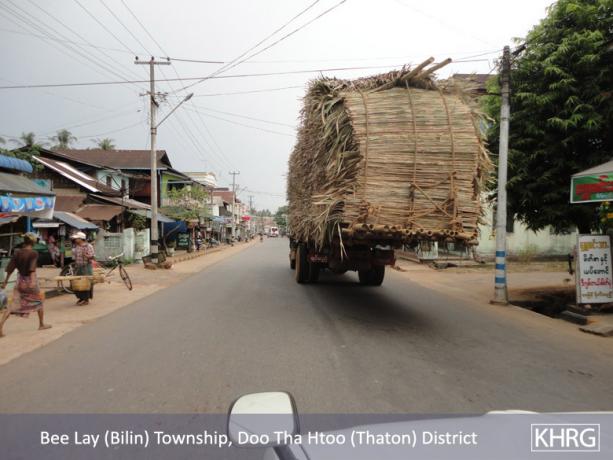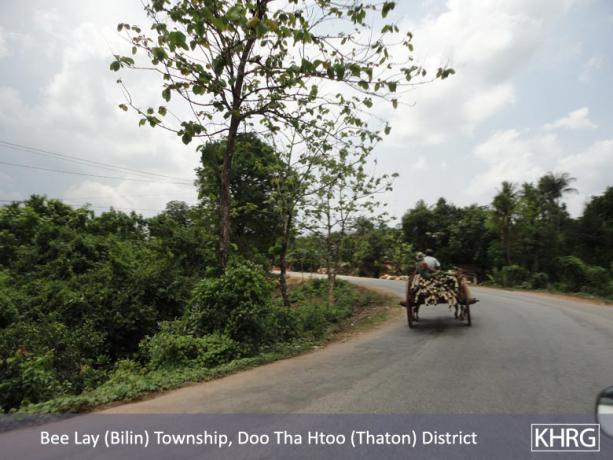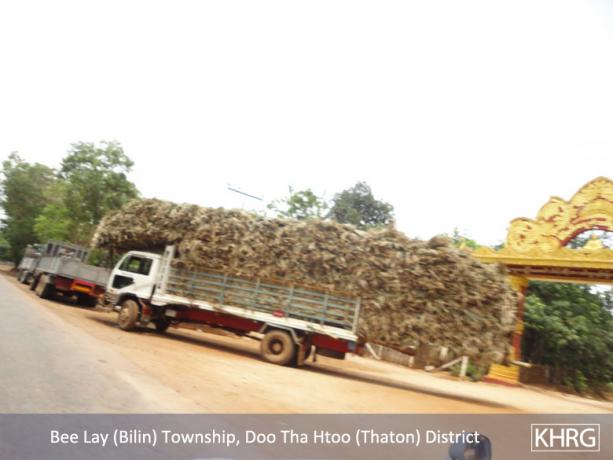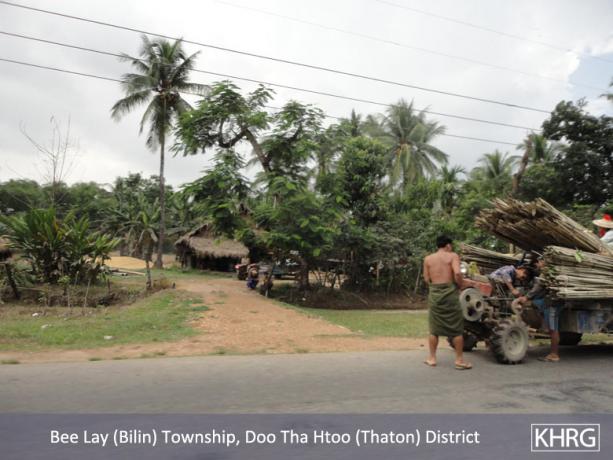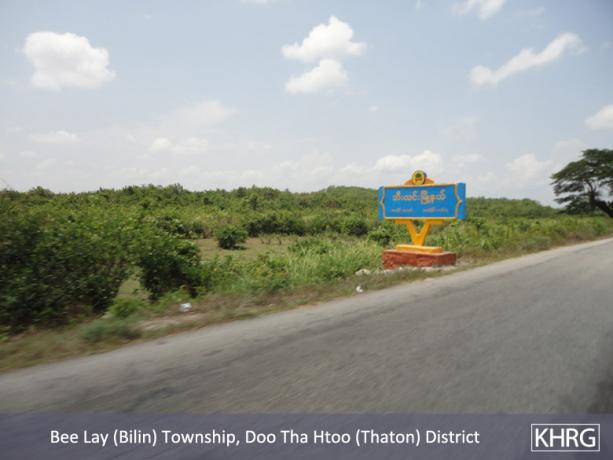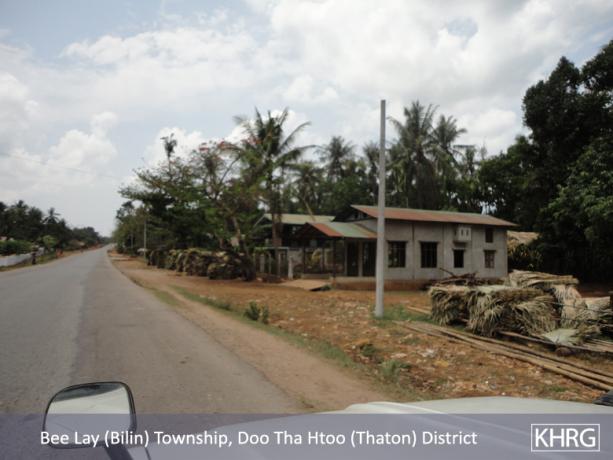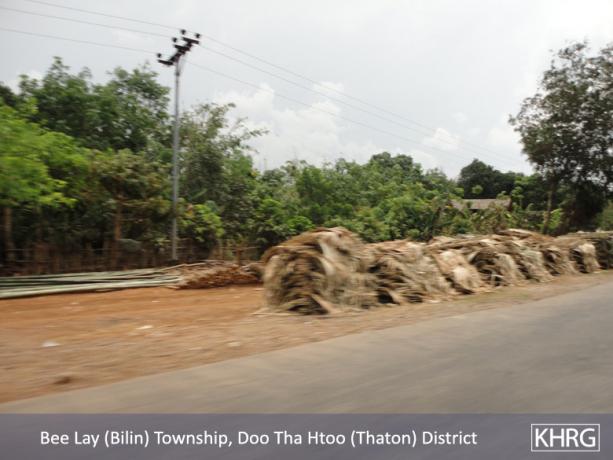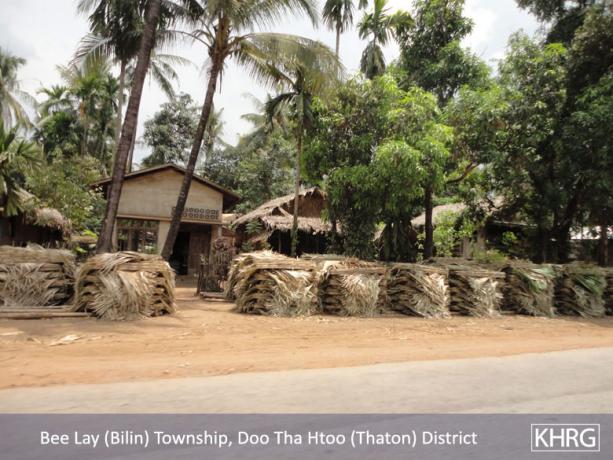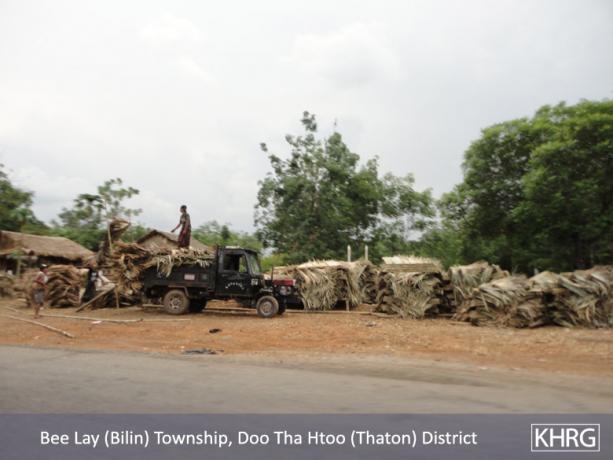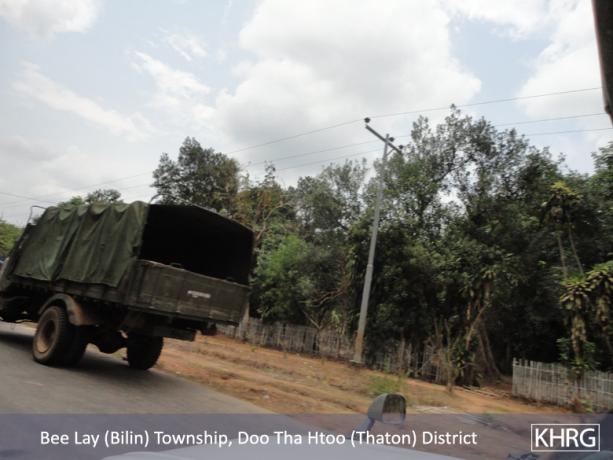During April 2012, residents of four village tracts in Bilin Township faced demands from Tatmadaw LID #44 for building materials, including 5,000 bamboo poles and more than 20,000 thatch shingles, as well as for service as set tha[1] messengers. Villagers responded to demands for building materials by providing less than the amount ordered and, in at least one case, by confronting armed soldiers and requesting payment, which was denied. The use of villagers to perform unpaid set tha messenger service at the Tatmadaw LID #44 camp in Lay Kay was ongoing as of April 30th 2012.
During April 2012, residents of four village tracts in Bilin Township provided more than 5,000 bamboo poles and 20,000 thatch shingles, as well as unpaid service as set tha messengers to Tatmadaw Light Infantry Division (LID) #44 soldiers in Bilin Township.
On March 27th 2012, LID #44 led by Camp Commander Naing Tin La, based in Lay Kay, ordered the residents of Lay Kay, Thu K'Bee, P'Ya Raw and Hkaw Poh Pleh village tracts in Bilin Township to produce a total of 5,000 small bamboo poles, known as wah may in Karen, and over 20,000 thatch shingles. Villagers complied in part with this order, and at least some of the thatch and bamboo was delivered to the camp at Lay Kay on April 2nd as ordered.
According to a community member in Bilin Township, LID #44 demanded a greater number of bamboo poles and thatch shingles from larger villages, including P'Ya Raw, Lay Kay, and Hkaw Poh Pleh villages, and less from smaller villages such as Thu K'Bee and Ler Poh villages.[2] Villagers did not provide the full amount that had been ordered; furthermore, on April 2nd 2012, when Y--- villagers were delivering bamboo poles to the camp in Lay Kay, the Y--- village head confronted some of the LID #44 soldiers and requested payment, but was denied.
According to a community member in Bilin Township, as of April 30th 2012, villagers from each of the four village tracts continued to be forced to provide unpaid service as set tha messengers for LID #44 soldiers at the Lay Kay camp. A table below shows the amount of building materials that were ordered to be delivered to Lay Kay camp from the four village tracts in Bilin Township on April 2nd 2012.[3]
| Location |
# Thatch shingles |
# Bamboo poles |
|
P'Ya Raw village tract |
5,000 |
1,000 |
|
Lay Kay village tract |
5,000 |
1,000 |
|
Hkaw Poh Pleh village tract |
5,000 |
1,000 |
|
Thu K'Bee village |
3,000 |
1,000 |
|
Ler Poh village |
3,000 |
1,000 |
While villagers were told that the thatch and bamboo building materials delivered on April 2nd were needed for the purpose of repairing the Tatmadaw camp at Lay Kay, community members said that they had no idea what happened to the thatch or bamboo after it was delivered.
Meanwhile, a KHRG staff member travelling between Thaton and Kyaikto towns on April 7th 2012 passed through Bilin and Kyaik Khaw towns and witnessed thousands of thatch shingles and bamboo poles stacked along the main road and more than 10 military trucks carrying thatch shingles and bamboo poles in both directions towards Yangon and Mawlamyine. In at least three different places, the thatch or bamboo was being loaded actively onto trucks or tractors at the roadside, while soldiers and four empty military trucks stood in the middle of the road outside the LID #44 camp at Wunhtaw, obstructing traffic on the road in both directions.
Thatch shingles and bamboo poles are common commercial goods that provide basic building materials for many homes in Burma. This is evident by the volume of these materials photographed by the KHRG staff member (below). While there is no definitive link between the thatch and bamboo seen by the KHRG staff member in the area of Bilin and Kyaik Khaw towns on April 7th and the 5,000 bamboo poles and 20,000 thatch shingles delivered to the Tatmadaw LID #44 camp in Lay Kay camp on April 2nd, it should be noted that Kyaik Khaw town is where the road to Lay Kay camp joins the main vehicle road that runs between Yangon and Mawlamyine.
In any case, the 5,000 bamboo poles and 20,000 thatch shingles that were ordered far exceeds the amount required to rebuild a single Tatmadaw camp. This suggests that local Tatmadaw commanders in this case may have levied forced labour demands to supplement their own lucrative commercial activities, without paying the villagers who were forced to produce the goods.
This photo, taken on April 7th 2012 in Kyaikto town, shows a truck laden with thatch shingles travelling west towards Yangon. [Photo: KHRG]
The photos above were taken on April 7th 2012 on the vehicle road between Kyaik Khaw and Bilin towns in Bilin Township, Thaton District. The photos show bamboo poles stacked by the roadside (top right), being transported by truck and horse cart (top left and middle), and being loaded onto a tractor (bottom left) respectively. Kyaik Khaw is where the road from the Tatmadaw LID 44 camp in Lay Kay joins this main road that connects Yangon to Mawlamyine. The last photo below right shows the sign entering Bilin town. [Photo: KHRG]
These photos were taken on April 7th 2012, between Bilin and Kyaikto towns. They show thatch shingles and bamboo poles piled next to the main road and, in one case, being loaded into a truck (bottom right). The KHRG staff member who took these photos was travelling at the same speed as motor traffic, so each photo represents a new pile of thatch or bamboo along the road. [Photo: KHRG]
These photos, also taken on April 7th 2012 show four empty military trucks (left) parked on the road in front of the LID #44 base at Wunhtaw along the main vehicle road between Bilin and Kyaikto towns. [Photo: KHRG]
Footnotes:
[1] Set tha is a Burmese term for forced labour duty as a messenger stationed at army camps or bases and serving as a go-between to deliver orders from army officers to village heads, but also involving other menial tasks when no messages are in need of delivery.
[2] P'Ya Raw, Lay Kay, Hkaw Poh Pleh, and Thu K'Bee are the larger villages within their respective village tracts of the same name; Ler Poh is a smaller village situated in P'Ya Raw village tract.
[3] The amounts given in the table reflect the most conservative estimates, based on figures provided by a community member.

